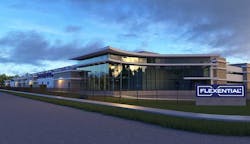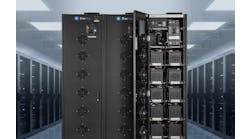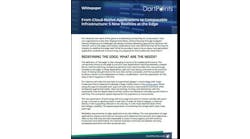Colocation and hybrid cloud provider Flexential will step up its building program for 2022. The company plans to expand its data center platform by adding 33 megawatts (MWs) of capacity, more than double the rate of expansion compared to 2021. Flexential expects to finish the year with over 220 MWs and 3 million square feet of capacity across 19 markets.
Flexential also outlined three new preconfigured blueprints designed to accelerating customer hybrid IT deployments, improving infrastructure performance and reducing latency to public clouds, partners and customers.
CEO Chris Downie said Flexential is seeking to step up its game in a period of active evolution for IT infrastructure.
“As we all reflect on the challenges of the past two years and look to the future to accommodate new realities, driving growth has never been a more complicated mission,” said Downie. “Traditional playbooks will not suffice. Companies must reimagine what it takes to meet the needs of their teams and their end-users.”
That strategy includes several expansions of data center infrastructure:
- Flexential has started construction on the first phase of a new highly-sustainable data center in the Atlanta market. At full build out, Atlanta-Douglasville will offer more than 150,000 square feet of IT space and 22.5 MWs of power capacity, and will showcase company’s latest energy- and water-efficient Gen 5 design.
- Flexential also said it has completed construction of its largest project in Oregon. The 36MW Hillsboro 3 data center now offers customers in Portland access to 358,000 square feet of space to address strong demand.
- The national platform expansion also builds on recently announced projects in the Denver, CO and Dallas, TX markets.
As it has grown beyond its roots as a regional provider, Flexential has built a national footprint and global connectivity. With its theme of “beyond four walls,” the company is targeting customers that need to connect across markets, and operates a private 100 GB network for its data centers.
The Atlanta and Hillsboro projects are the latest in a series of expansions and growth for Flexential, which recently raised $2.1 billion through an offering of asset-backed securities. Flexential said the funding “dramatically improves the company’s investment grade credit profile, lowers the cost of capital, and allows Flexential to deploy greater data center capacity to meet accelerating demands in new and existing markets.”
Flexential will also invest in adding further direct access to all major public cloud providers across its national private backbone in 2022. Through the Flexential Cloud Fabric, customers can reduce reliance on the public Internet for cloud connectivity and leverage a self-service portal to manage connections to cloud platforms like AWS, Azure and Google Cloud.
That move reflects a trend among leading colocation providers want to “cloudify” the colocation experience by equipping their data centers with programmable infrastructure, enabling customers to blend physical and virtual assets across technologies and geographies. This is driven by the rise of cloud computing, which has altered user expectations for how digital infrastructure is delivered. In an “as-a-service” world, customers expect to provision servers quickly through online services.
The three new FlexAnywhere blueprints are specifically designed to address key customer pain points, including scalability, application performance and reliability, and network performance and interconnection.
“We’re excited that Flexential is providing practical blueprints and support that will help our partners more rapidly address the pain points our joint customers face,” said Shane McNamara, EVP of Operations and Engineering, AVANT.” The FlexAnywhere solutions provide a highly scalable approach that will allow our partners to deploy hybrid IT projects for our customers with headroom for future growth.”






